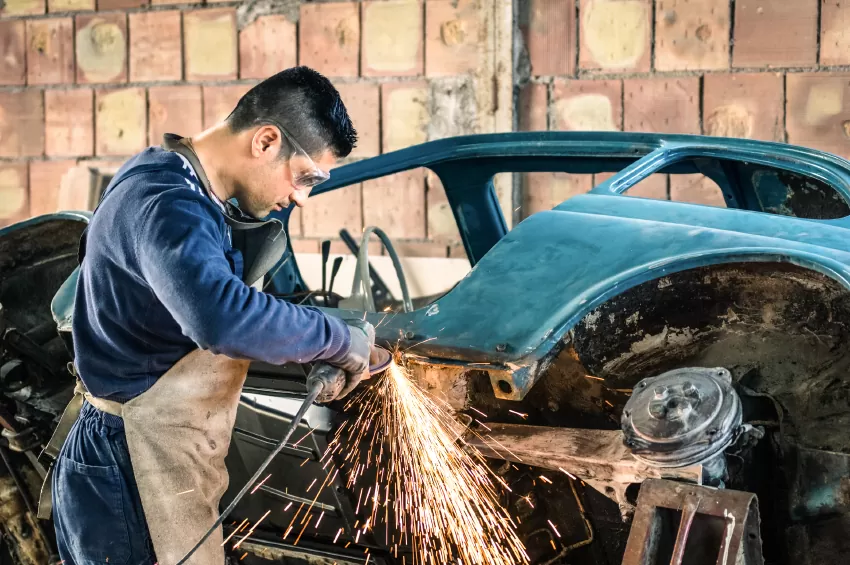
Auto body repairers are skilled professionals who restore vehicles to their former glory. Their work is essential for both the safety and aesthetics of your car. Let’s dive into the world of auto body repair and explore what makes this profession so vital.
The Role of an Auto Body Repairer
Daily Responsibilities
Auto body repairers are like the surgeons of the automotive world. They diagnose issues, repair damages, and ensure that your vehicle looks and functions like new. Their daily tasks can range from fixing minor dents to performing major structural repairs. They meticulously check every aspect of the vehicle to guarantee it meets safety and quality standards.
Skills Required
To excel in this field, one needs a blend of technical skills and a keen eye for detail. Knowledge of car structures, proficiency with various tools, and the ability to read technical manuals are all crucial. Furthermore, strong problem-solving skills and patience are vital, as some repairs can be complex and time-consuming.
Types of Auto Body Repair Services
Collision Repair
Collision repair is the most common service offered by auto body repairers. This involves repairing or replacing damaged parts after an accident. The goal is to restore the car to its pre-accident condition, both in terms of appearance and functionality.
Dent Repair
Dents can happen from minor bumps or hailstorms. Paintless dent repair (PDR) is a popular technique where technicians massage the metal back into place without the need for repainting. This method is cost-effective and preserves the original paintwork.
Paint Services
Auto body repairers also handle painting jobs. Whether it’s touching up a small scratch or completely repainting the vehicle, they ensure that the color matches perfectly and the finish is smooth.
Frame Straightening
Accidents can bend a car’s frame, affecting its structural integrity. Using specialized equipment, repairers can straighten the frame, ensuring the vehicle is safe to drive and aligns properly.
Tools and Equipment Used
Hand Tools
Basic hand tools like hammers, dollies, wrenches, and screwdrivers are fundamental. They are used for a variety of tasks, from removing parts to shaping metal.
Power Tools
Power tools, such as sanders, grinders, and drills, make the repair process more efficient. They help in tasks like smoothing surfaces and cutting through metal.
Specialty Equipment
Specialized tools like hydraulic jacks, welding machines, and frame straightening equipment are essential for more complex repairs. These tools enable precision and ensure high-quality results.
The Process of Auto Body Repair
Initial Inspection
The first step in any repair job is a thorough inspection. The repairer assesses the damage and determines what needs to be fixed or replaced.
Estimation
Next, an estimate is provided, detailing the cost of parts and labor. This helps the vehicle owner understand the extent of the repairs and the expected costs.
Repair Work
Once the estimate is approved, the actual repair work begins. This can include anything from fixing dents and scratches to replacing entire panels.
Quality Control
After the repairs are completed, a final inspection is done to ensure everything meets the required standards. This step is crucial to ensure the vehicle is safe and the repairs are up to par.
Training and Certification
Educational Requirements
Most auto body repairers have a high school diploma or equivalent. Many also complete technical training programs that provide hands-on experience.
Certification Programs
Certifications from organizations like the National Institute for Automotive Service Excellence (ASE) can enhance a repairer’s credentials. These certifications demonstrate a high level of skill and knowledge.
On-the-Job Training
Experience is invaluable in this field. Many repairers start as assistants and learn through on-the-job training, gradually taking on more complex tasks as they gain experience.
Safety Measures in Auto Body Repair
Personal Protective Equipment (PPE)
Safety is paramount in auto body repair. Technicians use PPE such as gloves, safety glasses, and respirators to protect themselves from hazards like sharp objects and harmful fumes.
Workshop Safety Protocols
Workshops adhere to strict safety protocols to prevent accidents. This includes keeping workspaces clean, properly maintaining equipment, and following correct procedures for handling materials.
Advancements in Auto Body Repair Technology
Computerized Diagnostics
Modern vehicles are equipped with complex electronics. Computerized diagnostic tools help repairers identify issues quickly and accurately.
Laser Measuring Systems
These systems ensure precise measurements when aligning frames or panels, leading to better repair outcomes.
Environmentally Friendly Paints
Eco-friendly paints reduce the environmental impact of auto body repairs. They are less harmful to both technicians and the planet.
Choosing a Reputable Auto Body Repair Shop
Research and Reviews
Look for shops with positive reviews and recommendations. Customer feedback can provide insights into the quality of work and customer service.
Certification and Accreditation
Shops certified by recognized bodies often meet higher standards of quality. Check for certifications from ASE or the Better Business Bureau (BBB).
Warranty and Guarantees
A reputable shop will offer warranties on their work. This ensures that if something goes wrong, they will fix it at no additional cost.
Common Myths about Auto Body Repair
DIY Fixes vs. Professional Repairs
While DIY fixes might seem cheaper, they often lead to more problems down the line. Professional repairs ensure the job is done correctly and safely.
Insurance Coverage Misconceptions
Many people believe insurance won’t cover certain repairs. However, comprehensive policies often cover a wide range of damages. It’s important to understand your policy and discuss options with your insurer.
Cost of Auto Body Repair
Factors Influencing Cost
The cost of repairs can vary widely based on the extent of damage, parts required, and labor involved. Other factors include the make and model of the vehicle and the repair shop’s location.
Average Costs for Common Repairs
Common repairs like fixing a dent or repainting a panel can range from a few hundred to a few thousand dollars. It’s always best to get multiple estimates to find a fair price.
Maintaining Your Vehicle Post-Repair
Care Tips
After repairs, it’s crucial to take care of your vehicle to maintain its new look. Regular washing, waxing, and avoiding harsh conditions can prolong the life of the repairs.
Regular Maintenance
Regular maintenance, such as oil changes and tire rotations, ensures your vehicle remains in good condition and can help prevent future damage.
Future of Auto Body Repair
Emerging Trends
The auto body repair industry is evolving with trends like 3D printing for parts and the use of advanced materials like carbon fiber.
Impact of Electric Vehicles
Electric vehicles (EVs) are changing the landscape of auto body repair. Technicians need to understand the unique aspects of EVs, such as battery systems and lightweight materials.
Conclusion
Auto body repairers play a crucial role in keeping our vehicles safe and looking great. Their expertise and dedication ensure that even after an accident, your car can be restored to its best condition. Whether it’s through advanced technology or meticulous craftsmanship, auto body repairers are essential to the automotive industry.
FAQs
How long does auto body repair take?
The time required for repairs varies based on the extent of the damage. Minor repairs might take a few hours, while major repairs can take several days or even weeks.
Can auto body repair fix any damage?
Most damages can be repaired, but some severe cases may require part replacements or may be deemed a total loss if the cost of repair exceeds the vehicle’s value.
Is it worth repairing an old car?
It depends on the car’s condition and sentimental value. If the car is in generally good shape and the cost of repairs is reasonable, it might be worth it.
How do I know if a repair shop is trustworthy?
Look for reviews, certifications, and warranties. A reputable shop will have positive feedback, proper credentials, and offer guarantees on their work.
What should I do immediately after a collision?
Ensure everyone’s safety, call emergency services if needed, and document the accident. Contact your insurance company and get your vehicle to a reputable repair shop for an assessment.



